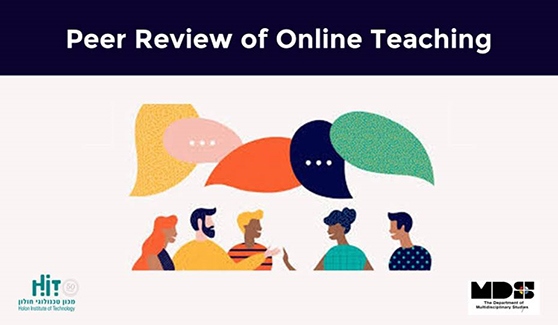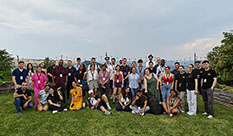More:
News & Stories
New Improved Path for Online Multidisiplinary Teaching
The first and only Department of Multi-disciplinary studies in Israel embarks on unprecedented journey to adapt teaching methods to new Corona-driven reality, and shares its findings in inaugural debut at the 2021 Chais Conference.

The Covid-19 crisis has challenged teaching and learning as we know it. Overnight, with no time to adequately prepare, online learning has become the sole pedagogical means available. The dramatic and sudden change in how we teach is wrought with unanticipated obstacles requiring real-time management of emerging issues. Thus, this year’s 16th CHAIS national conference on the Study of Innovative Learning Technologies appropriately focused on Learning in the Digital Age.
Standing out among the many presentations from higher educational institutions around the country was that put forward by Dr. Nava Shaked, Chairman of HIT’s unique Multidisciplinary Studies Department. In the Department’s inaugural debut at a conference of this nature, Dr. Shaked presented findings on "Online Learning Assessment: A Methodology for Peer Review in a Multidisciplinary Environment." The study was conducted under her leadership with research team members Dr. Hallel Eyal, Dr. Gili Peleg, Limor Sahar Inbar and Bracha Einhorn.
The primary question that the research strived to answer was how to evaluate the quality of teaching multidisciplinary studies during the Covid-19 crisis, which brought to the departmental ecosystem new, diverse, different and unfamiliar constraints.
The Multidisciplinary Studies Department provides HIT’s technology and design students with knowledge and skills beyond their core subjects, imbuing in them a well-balanced view of the world necessary for entry into industry and advanced studies. “We believe in the concept of “pra-cademics” in which the student can learn both design and technological language, entrepreneurship and innovation under the same roof," Dr. Shaked noted.
The Corona Pandemic was a game changer, which in a record speed of a single week took the Department from our comfort zone of frontal learning to a collection of unfamiliar events in multidisciplinary learning.
Many of their courses are driven by Project-Based Learning (PBL) which necessitates collaboration between students who do not know each other on topics greatly different from their core learning foci. This requires listening and physical presence.
Dr. Shaked: “In order for us to rapidly transition into this new reality, we embarked on a number of initiatives. In the first stage, we listened to our students in order to understand first-hand how they experienced the changes in the learning process. We conducted a cross-faculty focus group of students from various courses which validated the findings. Their feedback indicated that while they were satisfied with the way in which we geared up to on-line learning, studies via Zoom raised interesting challenges.
Together with this, we deemed it also important to conduct a theoretical examination of how these issues are being addressed elsewhere in the country and abroad -- although there are not many departments similar to ours in nature.”
“After reviewing the data, we decided to undertake an in-depth process – one that looks inward but also takes into account what lies ahead with the assumption that any new methodology created as a result of this study could continue to be utilized by us, because undoubtedly, the changes in our teaching methodologies will remain with us.”
“The next step was to build a methodology and process of ‘peer review’, which was chosen for the following reasons:
- Relatively short time frame.
- Positive-minded team in place committed to turning the difficulty into a new opportunity.
- Diversity in academic faculty enhancing the holistic process of peer review.
- Courses already recorded, enabling watching without interruption during the lesson.
We recognized that while peer review is highly beneficial, it also has it’s down sides if not sufficiently structured, properly communicated and efficiently managed. Peer review, we understood, could potentially antagonize the users. For this reason, we turned to learning experts from HIT’s Center for Teaching Advancement to guide us in our journey. Eventually, we decided to emphasize formative evaluation - to examine real-time processes and devise improvements during the learning process and not just to examine quantitative achievements and end-results. We selected observers with high interpersonal abilities who are highly qualified teachers with many years of experience, while maintaining gender equality. "It was not our purpose to examine course content but to look at the teaching methods themselves, to understand the extent to which the lecturer succeeds in getting his/her message across with the tools at hand. We developed a form with rating scales and open questions, which examined the way in which the content was taught, and not the academic content in and of itself.”
Each observer conducted a personal assessment of each lecturer, followed by a peer review. Then, each lecturer could hear and discuss these comments with our observer and relate to the issues raised. Finally, all the lecturers who participated completed a questionnaire about the process, its necessity, its contribution and the appropriateness of the underlying methodology.
The feedback was analyzed and the following issues were examined:
- Organization of lessons, materials and structure.
- The form of communication and the technological interfaces.
- Student and lecturer experience.
All aspects emerging from the feedback were examined and the results were presented in a summary table to the lecturers. This facilitated a very fruitful discussion which yielded a list of activities and plan of action for improvements -- all to maintain and enhance the Department’s commitment to maintain the highest standards of teaching.
At the end of the process, we concluded that the chosen methodology was effective, opening up new opportunities to learn, gain different perspectives while also creating a sense of teamwork and academic camaraderie during a time of distance and isolation.
Posted: 25/02/2021
- News & Events
International Week of Interdisciplinary Studies and Academic Collaborations in Crete
A substantial delegation of 16 students and four faculty members from HIT Holon Institute of Technology participated in week-long international activities and events at HMU-Hellenic Mediterranean University in Crete. ...


 Additional programs
Additional programs
